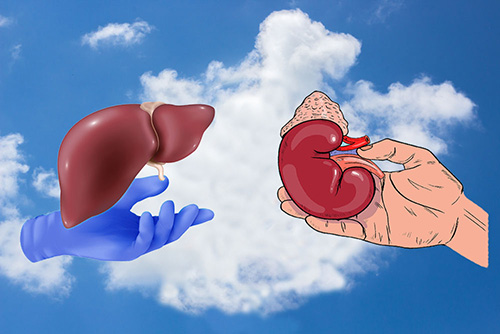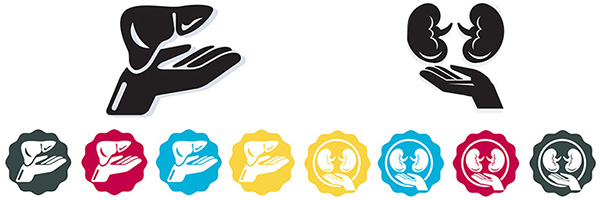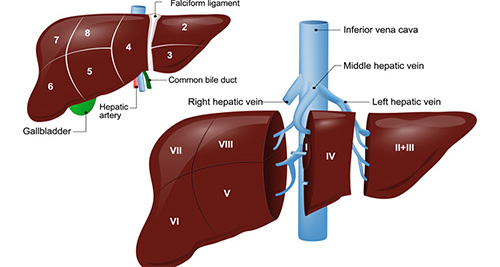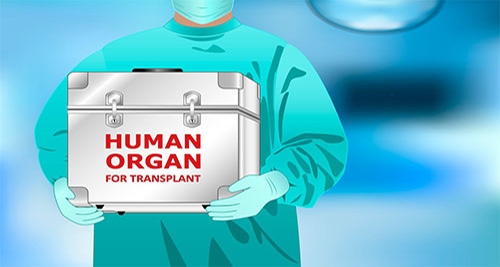Organ, Kidney and Liver Transplantation in Turkey

- Kidney Transplant in Turkey
- From whom is the transplanted kidney taken?
- How is the kidney transplant procedure performed?
- What happens to the old kidney after a kidney transplant?
- What are the benefits of kidney transplant?
- What are the risks of kidney transplant?
- Recovery Process After Kidney Transplantation
- Liver Transplant in Turkey
- When is a liver transplant necessary?
- What tests are required before having a liver transplant?
- From whom should the liver to be transplanted be obtained?
- How is liver transplant operation performed?
- What are the possible complications after liver transplant?
- When can you go home after liver transplant?
Organ donation is the process of surgically removing an organ or tissue from an organ donor and placing it in another person. Organ transplantation is necessary when the organ of the patient has lost its function or has been damaged by a disease or an injury.
Organ transplantation is one of the greatest advances in modern medicine. While the success rate of liver, heart and kidney transplants is high in Turkey, pancreas transplants are also performed recently.
Although organ transplantation can give patients a healthy life and a longer life expectancy, it is also a major surgery that carries potential risks and disadvantages such as organ rejection.
Not every organ can be transplanted. The most commonly transplanted organs are:
- Kidney transplant due to diabetes, polycystic kidney disease, lupus or other problems
- Liver transplantation as a result of cirrhosis and many other causes
- Heart transplant due to coronary artery disease, cardiomyopathy, heart failure and other heart problems
- Pancreas transplant due to diabetes
- Lung transplant for cystic fibrosis, COPD and other lung problems
- Small bowel transplant for short bowel syndrome caused by necrotizing enterocolitis, Crohn's disease and other problems
More than one organ can be transplanted at the same time. For example, it is possible to transplant a heart and a lung together.
Not everyone is a good candidate for an organ transplant. Your doctor will do tests to see if you are a good candidate for an organ transplant. If you have an infection, uncontrolled heart disease, drug, alcohol problem, or other serious health condition, you are probably not a good candidate for a transplant.
What is the success rate in organ transplantation?
The procedure applied in organ transplant surgery is always developing and transplants are performed more successfully every day. The success of organ transplantation depends on the following parameters:
- Which organ was transplanted
- How many organs were transplanted
- Disease that causes your organ to fail

Preparation before organ transplant
First, you'll need to have blood and tissue tests that will be used to match you with a donor.
You will need to take care of your health. Continue to take your medications as prescribed and have regular blood tests. Follow your doctor's instructions about food and exercise.
How long does organ transplant surgery take?
Many parameters determine the duration of the surgery, including which organ will be transplanted. For example, if you have previously had surgery on an organ that required a transplant, or if you have had a transplant before, the surgery may be expected to take a shorter time.
Transplant surgery times are very different. E.g:
- Liver transplant, 6 to 12 hours
- Kidney transplant, 4 to 5 hours
- Pancreas transplant, 4 to 8 hours
- Both kidney and pancreas transplants take 6 to 12 hours.
Your surgeon will give you a better estimate based on your situation.
Post-Surgery Recovery Process
The recovery process depends on which surgery you have and the standard process followed by your hospital. You can be taken to the intensive care unit immediately after the operation.
You will be able to see your visitors as soon as your doctor decides that you are well enough. If you feel well, you can see your visitors even on the same day after your surgery.
The length of stay in the hospital depends on the surgery you have had. Usually 4 or 5 days for kidney transplant; You may need to stay in the hospital for 7 to 10 days, usually for a kidney and pancreas transplant. This period is usually 7 to 10 days for liver transplantation.

After Organ Transplant Surgery
The issues you need to pay attention to after surgery will depend on the transplanted organ, any other health problems you have, and how your body responds to the new organ.
You will need to take certain medications every day for the rest of your life to prevent your immune system from rejecting the new organ (organ rejection). As time goes on, your doctor may ask you to stop using some of these medicines.
Because anti-rejection medications weaken the immune system, you have a higher risk of catching a cold or other infection. You may need to stay away from crowded environments for a while and stay away from people who are sick.
You should also have regular checkups and blood tests to see how well your newly transplanted organ is working.
You may need to make lifestyle changes to keep your new organ healthy and strong. These changes include habits such as eating healthy foods, exercising regularly, and getting enough sleep. Your doctor will assist you in planning the necessary changes.
Organ Rejection Symptoms
Even though organ rejection is one of the biggest concerns, it doesn't always mean you will lose the transplanted organ. It usually means your medication needs to be adjusted again. When a new combination of drugs that works, the rejection can be stopped.
However, that doesn't mean you can ignore the problem. You need to be alert to the signs of rejection. Symptoms of organ rejection vary depending on the type of organ transplanted. Common symptoms include:
- Pain at the transplant site
- General feeling of weakness
- Fatigue/lack of energy
- Flu-like symptoms
- Fever
- Weight changes
- Change in heart rate
- Less frequent urination
After the transplant surgery, the possibility of rejection of the organ decreases over time. However, organ rejection can develop even years after surgery. For this reason, it is very important to keep your condition under control and to have regular check-ups.
Kidney Transplant in Turkey

A kidney transplant is a procedure in which a new donor kidney is placed in your body. The transplant is usually done because of kidney failure. After the transplant, your new kidney will start doing the job of the old kidney that has lost its function.
From whom is the transplanted kidney taken?
Kidneys to be transplanted surgically are provided by living donors and deceased donors. Living donors are usually close family members and, in some cases, spouses of the patient. Kidneys from deceased donors are usually taken from people who agree to donate their kidneys by signing organ donation cards before they die. Donation permission can also be given by the deceased's family at the time of death.
All donors are carefully screened to ensure the kidney to be transplanted will be a suitable match and to prevent infectious diseases and other complications.
How is the kidney transplant procedure performed?
Kidney transplantation involves placing a healthy kidney in the body to perform all the functions that a dysfunctional kidney cannot.
The new kidney is placed on the lower right or left side of your abdomen, where it will be surgically connected to nearby blood vessels. Placing the kidney in this position allows it to easily connect to the blood vessels and bladder. The vein and artery of your transplanted kidney are connected to your vein and artery. The new kidney's ureter is connected to your bladder to let urine out of your body.
What happens to the old kidney after a kidney transplant?
In most cases, diseased, dysfunctional kidneys are not removed from the body. There are three conditions that may require removal of your diseased kidneys:
- Presence of recurrent infection in the old kidney that may spread to the transplanted kidney
- Uncontrollable hypertension caused by your original kidneys
- Accumulation of urine in your kidneys

What are the benefits of kidney transplant?
A successful kidney transplant will noticeably improve your general condition. After the transplant, you can return to a more normal lifestyle and have more control over your daily life.
Patients who have to be on dialysis do not need dialysis after kidney transplantation.
Anemia, a common problem with kidney failure, may improve after transplantation. In patients with hypertension problems, the need to use blood pressure medication after transplantation may disappear or decrease.
What are the risks of kidney transplant?
The risks of a kidney transplant are the same as any other surgery. There is a risk of bleeding, infection or respiratory problems during surgery. You may also experience some side effects of the medications you will use after the transplant, and you may be more prone to infections because the medications you take after the transplant reduce your body's ability to fight infection.
There is also a risk of rejection of the transplanted organ. When the body sees the new kidney as a foreign body, it will normally try to get rid of it or "reject" it. However, your doctor will give you certain medications to prevent this from happening.
Recovery Process After Kidney Transplantation
Following the advice below after your surgery will ensure that you do not harm yourself or your new kidney:
• Avoid lifting heavy objects and strenuous physical work for at least six to eight weeks after surgery. It is important that you do not lift anything heavier than 20 pounds for the first two to three months and 40 pounds for four to six months from the date of surgery.
• Avoid driving for at least six weeks after surgery. Plan ahead so a friend or family member can help you with this during this time.
• Exercising is recommended. We recommend starting with stretching exercises and walking. Other excellent exercises include jogging, walking, cycling, tennis, golf, swimming and aerobics. All of these can help you regain your strength and can be started gradually after the incision has healed.
• You should avoid sports involving hard contact as it may damage your transplanted kidney. Consult your doctor if you are in doubt about any activity.
Most kidney transplant patients are able to return to work within a few months after successful surgery. However, some problems you may experience during the healing process may prolong this period.
Liver Transplant in Turkey

A liver transplant can be performed when the liver no longer functions adequately (liver failure) due to complications from an infection or certain medications or conditions.
When is a liver transplant necessary?
Liver transplantation is considered when the liver can no longer function adequately (liver failure). Two possible causes of liver failure are an acute (sudden) liver failure from infection or complications from certain medications.
Long-term liver failure is more common and may occur as a result of:
- Conditions such as chronic (long-term) hepatitis for a variety of reasons, including autoimmune liver disease (inflammation and scarring of liver tissue) and primary sclerosing cholangitis (scarring and narrowing of the bile ducts inside and outside the liver), cause bile accumulation in the liver and liver failure.
- Biliary atresia, a common cause of liver transplant in children, manifested by scarring of the bile ducts and abnormal inflammation.
- Metabolic liver disorders, including urea cycle defects.
- Acute liver failure, including Wilson's disease (a rare inherited disease in which copper builds up abnormally in the body, including in the liver).
- Liver cancer
What tests are required before having a liver transplant?
Your doctor will want to review all of your medical records, x-rays, liver biopsy results, surgery reports, and your medication list at your initial evaluation. Some or all of the following work is usually performed during your assessment to supplement missing tests and update existing ones:
- Computed tomography (CT scan), which uses X-rays and a computer to create images showing liver size and shape, blood flow, any liver lesions
- Doppler ultrasound to determine if the blood vessels to your liver are open.
- Echocardiogram and stress test for adults to help evaluate your heart.
- Pulmonary function test to determine your lungs' ability to exchange oxygen and carbon dioxide.
- Blood tests and serology screening to determine blood group, coagulation ability and biochemical status of blood and measure liver function
If these tests reveal certain problems, your doctor may order additional tests.
From whom should the liver to be transplanted be obtained?
In liver transplantation, the organ to be transplanted can be taken from a living donor or cadaver.
Liver transplantation from a living donor is an option for some patients with advanced liver disease. In this procedure, a piece of liver is taken from a healthy living donor and implanted into the patient. The liver segments of both donor and recipient will grow to adequate size within a few weeks.
The donor, who may be a relative, spouse, friend, or in some cases a completely anonymous altruistic individual, will undergo extensive medical and psychological evaluations during and after the transplant procedure to ensure that there is as little risk as possible. Blood type and body size are important factors in determining who is a suitable donor.
Hospitals will evaluate all potential donors for the presence of liver disease, alcohol or drug abuse, cancer or infection. Donors will also perform serology tests and other infection tests. If this scan does not reveal liver-related problems, donors and recipients are matched by blood type and body size. Age, race and gender are not taken into account in the transplant.

How is liver transplant operation performed?
Liver transplants usually take 6 to 12 hours. During surgery, surgeons will remove your dysfunctional liver and replace it with donor liver.
Because transplant surgery is a major procedure, surgeons will need to insert several tubes into your body. These tubes will help your body perform certain functions during the operation and for several days afterward.
- A tube will be inserted through your mouth into your windpipe to help you breathe during the surgery and for the first two days after the surgery. The tube is connected to a ventilator that will mechanically expand your lungs.
- A nasogastric tube will be inserted through your nose into your stomach to drain the secretions in your stomach. It will stay in place for a few days until your bowel function returns to normal.
- A tube called a catheter will be placed in your bladder to drain the urine. This will be removed a few days after the operation.
- Tubes will be placed in your abdomen to drain the blood and fluid around the liver. These will stay in place for about a week.
What are the possible complications after liver transplant?
Two of the most common complications after liver transplantation are transplant rejection and infection:
- Organ Rejection: Your immune system works to destroy foreign substances that invade your body. But the immune system can't tell the difference between your transplanted liver and unwanted invaders like viruses and bacteria, so it tries to attack and destroy your new liver. This is called the rejection period. About 30% of all liver transplant patients have some degree of organ rejection in the first year. Patients take preventive drugs to prevent the immune system from attacking the transplanted organ.
- Infection: Liver transplant patients are at high risk for infection, as anti-rejection drugs suppress the immune system. This problem subsides over time. Not all patients have problems with infections, and most can be successfully treated when infections occur in these patients as well.
When can you go home after liver transplant?
The average hospital stay after liver transplant is 10 to 14 days. Some patients are discharged in less than a week, while others may stay in the hospital longer depending on complications that may arise.
To ensure a smooth transition from hospital to home, caregivers and your doctor will begin preparing you for discharge shortly after you are transferred from the intensive care unit to the regular care floor. You will be given a discharge guide or verbal debriefing that reviews most of what you need to know before going home.
For detailed information about Organ Transplant Status, Types and Processes in Turkey please click here >>
For detailed information about Organ Transplant Law, Conditions and Fee Situation in Turkey please click here >>

